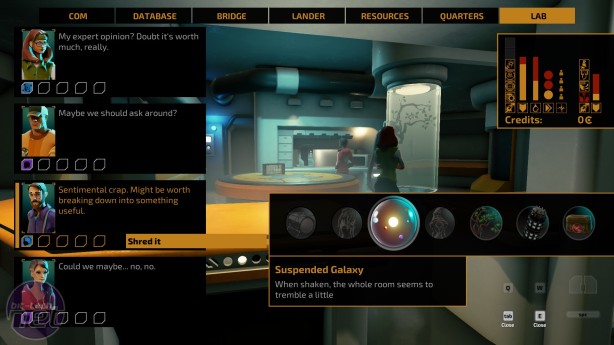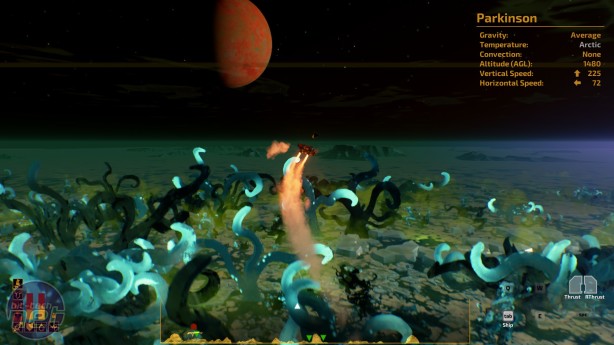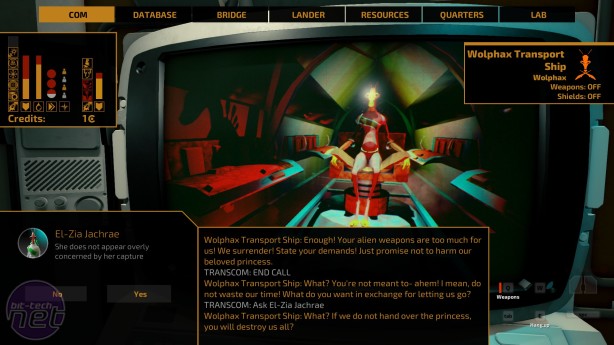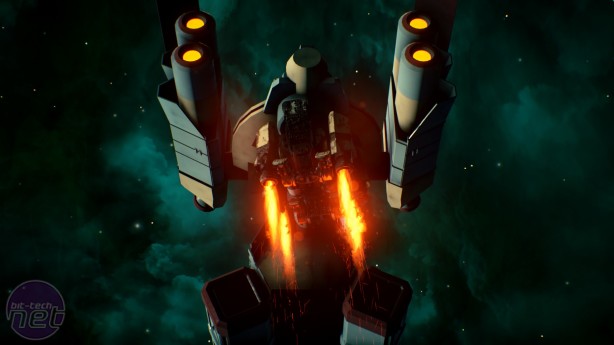
The Long Journey Home does a fantastic job of making its aliens feel, well, alien, to the point where deciphering the semantics of conversations can be a challenge in itself. Each race uses language and interprets the world in a distinct way, and it’s entirely possible to step on cultural toes without fully understanding what you’ve done that caused offence. This overcoming of linguistic barriers and forging of friendships and alliances is one of the game’s strongest assets.
Quests, too, are fun and interesting. In one example, I had to pose as a pirate and “kidnap” a princess so that a lovestruck Wolphax Knight could stage a brave rescue. These quests often have multiple stages to them, taking you to several systems, which eats into your supplies and fuel reserves. But the rewards at the end tend to be substantial compared to the smaller yet more frequent rewards for exploring planets.
Alongside these scripted encounters, the game’s systems are similarly capable of producing thrilling interstellar adventures. Both your ship and lander can be damaged and destroyed, while you also need to find fuel for both your jump-drive and your engines for in-system travel. This often results in tough dilemmas, such as being forced to scour a hazardous lava planet for resources to convert into fuel or venturing into an asteroid belt with your damaged ship to seek out minerals so you can make vital repairs.
Some stories result from the characters who populate your ship. You select your crew from a pool of available characters, each with their own abilities and specific personality. I brought on a theoretical physicist, whose special item was a set of pills. At one point I was short on fuel and sold these pills, only to later to discover they were intended to suppress his crippling psychosis. Other tales are a consequence of exploration. Venturing into a starship wreck, I chanced across a fuel canister that would completely refuel my ship. Yet the canister also contained some alien bacteria that caused an infestation through the ship’s crew. Only a last minute stop at a starship hospital averted disaster.
Considering this stuff on its own, I like The Long Journey Home just fine. It’s a great engine for stories both tailored and more procedural. As I mentioned earlier, however, I simply couldn’t enjoy it because of the terrible, appalling controls. Basically, The Long Journey Home attempts to mimic the reality of travelling through space, offering a light simulation of thrust and inertia. Accelerate using your thrusters and you’ll remain at that speed until you use reverse thrusters. You need to manage your speed and angle appropriately to successfully enter orbit around a planet. All of this is done using the left and right buttons of the mouse, while turning the ship is tied to the mouse cursor.
The problem is this semi-simulatory control scheme fits extremely poorly with The Long Journey Home’s story-driven roguelike. Simply entering orbit around a planet can be an incredibly fiddly process. Planetary landings are arguably even worse, as your lander only has upward and downward thrusters, so you have to spin the lander in order to move sideways.
Couple this with varying gravity on each planet and other challenges such as convection currents in gas giants, and the result is like playing darts with a feather – horribly unwieldy and inaccurate. It can reach the point where the entire experience descends into farce, as you hop along a planet’s surface upside down in your lander because the gravity is so low that too much thrust will catapult you to the other side of the map.
The dreadful controls have a compound effect on the rest the game. Each time you overshoot a planet or miss a landing site, it eats into your fuel reserves and often damages your ship. Consequently, many of the problems you need to deal with, like broken systems or lack of fuel, emerge not from space battles or quests but from simply attempting to do the most basic tasks in the game. At its worst, this turns what is already an annoying flaw into something potentially game ending.
It’s such a shame. Beyond this barrier I can see a game that I would really enjoy, that I could happily spend hours with exploring galaxies and gossiping with alien congregations. But each time I jump in I am instantly rebuffed by its unnecessarily fiddly interactions. It’s rare for a single problem in a game to dominate in this way, but sadly The Long Journey Home shows how one little flaw can hurl you light years away from greatness.
Quests, too, are fun and interesting. In one example, I had to pose as a pirate and “kidnap” a princess so that a lovestruck Wolphax Knight could stage a brave rescue. These quests often have multiple stages to them, taking you to several systems, which eats into your supplies and fuel reserves. But the rewards at the end tend to be substantial compared to the smaller yet more frequent rewards for exploring planets.
Alongside these scripted encounters, the game’s systems are similarly capable of producing thrilling interstellar adventures. Both your ship and lander can be damaged and destroyed, while you also need to find fuel for both your jump-drive and your engines for in-system travel. This often results in tough dilemmas, such as being forced to scour a hazardous lava planet for resources to convert into fuel or venturing into an asteroid belt with your damaged ship to seek out minerals so you can make vital repairs.
Some stories result from the characters who populate your ship. You select your crew from a pool of available characters, each with their own abilities and specific personality. I brought on a theoretical physicist, whose special item was a set of pills. At one point I was short on fuel and sold these pills, only to later to discover they were intended to suppress his crippling psychosis. Other tales are a consequence of exploration. Venturing into a starship wreck, I chanced across a fuel canister that would completely refuel my ship. Yet the canister also contained some alien bacteria that caused an infestation through the ship’s crew. Only a last minute stop at a starship hospital averted disaster.
Considering this stuff on its own, I like The Long Journey Home just fine. It’s a great engine for stories both tailored and more procedural. As I mentioned earlier, however, I simply couldn’t enjoy it because of the terrible, appalling controls. Basically, The Long Journey Home attempts to mimic the reality of travelling through space, offering a light simulation of thrust and inertia. Accelerate using your thrusters and you’ll remain at that speed until you use reverse thrusters. You need to manage your speed and angle appropriately to successfully enter orbit around a planet. All of this is done using the left and right buttons of the mouse, while turning the ship is tied to the mouse cursor.
The problem is this semi-simulatory control scheme fits extremely poorly with The Long Journey Home’s story-driven roguelike. Simply entering orbit around a planet can be an incredibly fiddly process. Planetary landings are arguably even worse, as your lander only has upward and downward thrusters, so you have to spin the lander in order to move sideways.
Couple this with varying gravity on each planet and other challenges such as convection currents in gas giants, and the result is like playing darts with a feather – horribly unwieldy and inaccurate. It can reach the point where the entire experience descends into farce, as you hop along a planet’s surface upside down in your lander because the gravity is so low that too much thrust will catapult you to the other side of the map.
The dreadful controls have a compound effect on the rest the game. Each time you overshoot a planet or miss a landing site, it eats into your fuel reserves and often damages your ship. Consequently, many of the problems you need to deal with, like broken systems or lack of fuel, emerge not from space battles or quests but from simply attempting to do the most basic tasks in the game. At its worst, this turns what is already an annoying flaw into something potentially game ending.
It’s such a shame. Beyond this barrier I can see a game that I would really enjoy, that I could happily spend hours with exploring galaxies and gossiping with alien congregations. But each time I jump in I am instantly rebuffed by its unnecessarily fiddly interactions. It’s rare for a single problem in a game to dominate in this way, but sadly The Long Journey Home shows how one little flaw can hurl you light years away from greatness.

MSI MPG Velox 100R Chassis Review
October 14 2021 | 15:04













Want to comment? Please log in.